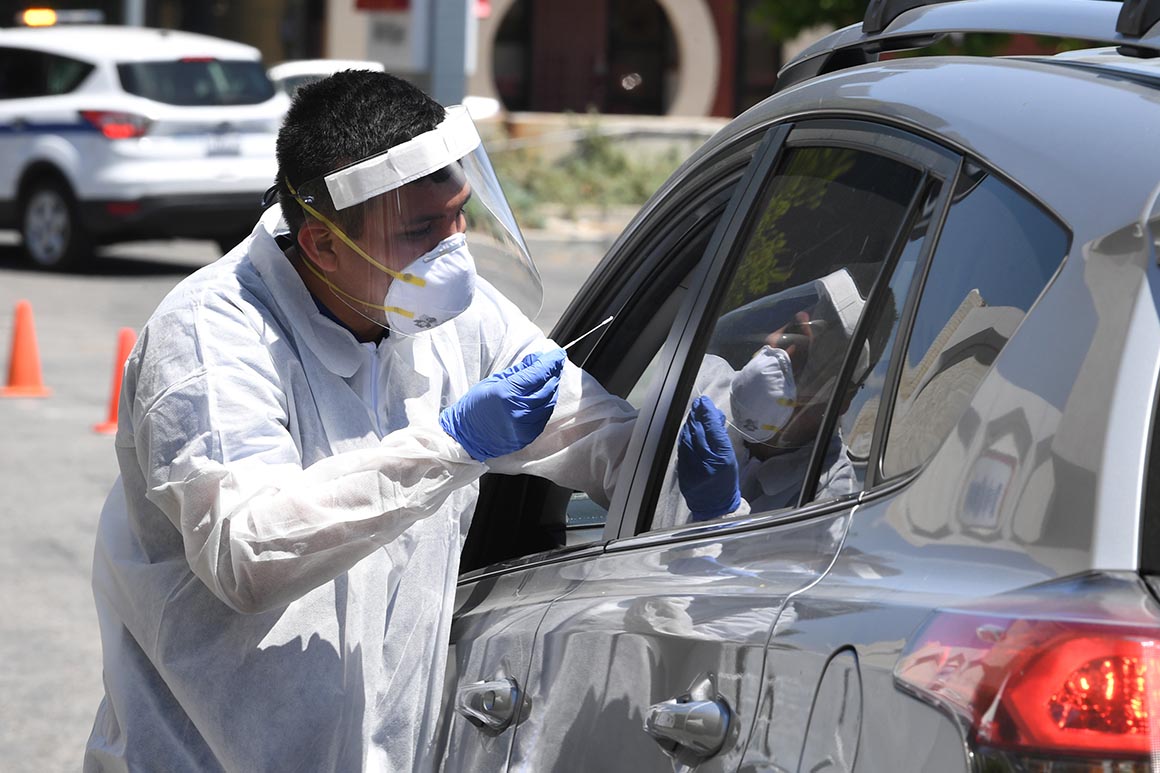
The state regulations apply only to Obamacare markets and other individual coverage, not to most workplace plans that still cover the majority of the nation’s privately insured. Likewise, the states can’t dictate how labs bill for the tests.
But their actions underscore the potential for price gouging and other abuses that the Trump administration and Congress didn’t fully address as they rushed to boost testing capacity in the early weeks of the pandemic.
The Trump administration issued a transparency rule that required labs and hospitals to post the cash prices for their Covid-19 tests — a move that, in theory, would limit what insurers have to pay out-of-network providers. But industry officials say the administration hasn’t rigorously enforced the requirement, which carries fines, and that some hospitals and labs aren’t complying,
Major commercial labs like Quest and LabCorp have posted cash prices ranging from $95 to $209 for the widely used PCR test that tells if someone is actively infected, according to Julie Khani, president of the American Clinical Laboratory Association.
A Department of Health and Human Services spokesperson cited a fact sheet stating the transparency policy remains in effect until the end of the public emergency declared for Covid-19 but declined to say whether fines have been assessed.
States that have moved recently to crack down on test pricing include North Dakota, where Insurance Commissioner Jon Godfread urged out-of-network labs and facilities to accept health plans’ top contracted rate as the “full and final payment” for tests. He also warned not to send surprise bills to the patients, and told hospitals they should send test specimens only to those labs that contract with the patient’s insurer.
Tennessee Insurance Commissioner Hodgen Mainda made similar moves early in the pandemic, telling labs to bill patients’ health plans at the insurer’s in-network rate and not to bill patients directly.
Plans, employers and regulators concede that the high out-of-network charges might be outliers but pose problems as testing proliferates.
Employers that pay for their health care and aren’t governed by state laws are particularly concerned about surging costs as they stagger back from lockdowns. Elizabeth Mitchell, CEO of the Pacific Business Group on Health, which represents large employers, said out-of-network bills compose only 3 percent of her member companies’ total claims but 16 percent of testing costs.
“Price gouging for testing is real,” she said.
And Jamie Dudensing, CEO of the Texas Association of Health Plans, said as her members see high charges coming in from a small set of providers they’re calling out as the group presses for more oversight against price gouging and surprise billing.
“It definitely affects affordability at the moment, and it will affect affordability in the long run,” she said.
But controlling prices is complicated by questions about whether some coronavirus tests are „medically necessary“ — a criterion that has kept shifting as more is learned about the disease and how it spreads.
Federal guidance gives doctors the discretion to decide whether to order a coronavirus test. Insurers are supposed to cover the full cost. But some states have given health plans more leeway to get out from under the mandate by questioning whether the test is needed.
For instance, Blue Cross Blue Shield of Mississippi, the state’s dominant plan, won’t cover diagnostic tests of people not showing symptoms of Covid-19 if they’re being used to clear the person to return to work, or for public health surveillance, among other reasons.
Khani said some insurers have tried to get out of paying lab claims even for those patients showing symptoms. She said her trade group is in discussions with plans and employers over whether public funding should pay for some surveillance testing.
“One thing as we have these conversations that’s very clear: If labs are performing the tests, they need to be reimbursed for the service,” she said.
That’s the next battle, as local health leaders push this kind of surveillance testing of samples of the population to get people back to work. State regulators are looking for Trump administration guidance on what to require from their plans.
Some critics watching insurer profits roll in during the public health crisis say plans should keep paying, while health plans and some of their regulators say that relying totally on private insurance will just drive premiums and health costs even higher.
“If you put everything under private insurance the costs will never go down,” Dudensing said. “It creates an environment where you’re creating a larger opportunity to price gouge, unless the government on the flip side of that comes back and talks pricing.”
Source: politico.com
See more here: news365.stream






